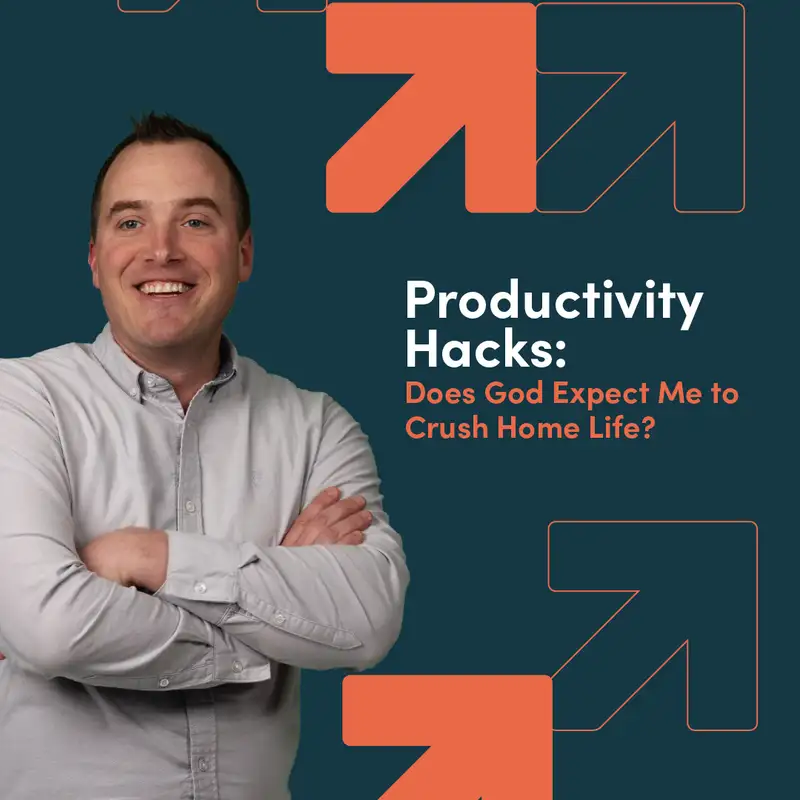Productivity Hacks: Does God Expect Me to Crush Home Life?
(0:08) Hello, everyone. (0:10) Thanks for listening to Wake Up, Look Up, a podcast where we connect events happening (0:15) in real time to the gospel of Jesus Christ. (0:18) I'm Zach Weihrauch.
(0:19) And in today's episode, we're talking about productivity hacks, and we're asking the question, (0:24) does God expect me to crush home life? (0:27) This is prompted by an article I read in The Atlantic this week about a growing trend on (0:32) social media, a lot on TikTok about not just crushing your 9 to 5, your job, but crushing (0:39) your 5 to 9, meaning when you get home, being just as productive in the things you do at (0:45) home. (0:46) And so what these influencers are showing is a routine that kind of mirrors workplace (0:50) structure, encouraging task completion and systematizing your life so that when you get (0:57) home, you're exercising, you're making dinner, you're prepping food for the next day, you're (1:02) laying out your clothes so that you are just as hustling, just as moving at home as you (1:09) are at work. (1:11) And what's interesting is it's driving an online kind of debate over whether or not (1:16) that's good.
(1:17) Should we keep ourselves in high gear at home, making sure we're getting the things done (1:22) there at a high level, or should home be a kind of sanctuary, a place away from work? (1:28) This is a really kind of practical and pressing question because my guess is most of us fall (1:34) in one place or the other on the continuum, either driven by discipline and productivity (1:39) or driven to rest and lethargy, falling somewhere on there. (1:44) And my guess is sometimes we all wonder, no matter which direction we tend to go, whether (1:49) or not we're right and whether or not we're missing something. (1:52) So what does the Bible say about home life productivity? (1:57) Well, the answer might surprise you.
(1:59) It's a little nuanced. (2:00) I mean, after all, let's just start here. (2:02) Ephesians 5 tells us to use time wisely because the days are evil.
(2:07) We need to make the most of them. (2:09) Now Ephesians 5 doesn't have in mind meal prepping, probably, but the point still holds. (2:15) Time is evil in the sense that if we don't think intentionally about it, we end up drifting (2:22) through life.
(2:23) We end up falling short of the things God wants us to be, whether that is productive (2:28) or whether that is being just loving and kind to those around us. (2:32) The Ephesians 5 passage pushes us towards a kind of intentionality, and yes, that intentionality (2:39) happens at work. (2:40) It also needs to happen at home.
(2:43) Meaningful parenting conversations, intimacy with a spouse, family worship, being a good (2:50) steward of the home that you have. (2:51) Those are all things that the Bible would teach us, and those are things that we're (2:55) probably not going to be good at if we don't have some kind of structure and routine, some (3:00) kind of commitment to doing them well. (3:04) However, of course, the Bible also calls us to rest.
(3:07) In Exodus 20, when God gives the Ten Commandments, one of those commandments is to take a Sabbath (3:14) day of rest. (3:15) That's because God is reminding Israel that as productive as they needed to be, their (3:21) ultimate hope was not in the productivity of their work, but in their actual relationship (3:27) with God. (3:27) It was God who was going to bless them.
(3:29) It was God who was going to keep them safe. (3:31) It was God who was going to feed them. (3:32) It was God who was going to take care of them.
(3:34) The Sabbath wasn't fundamentally about physical rest, although certainly that was helpful. (3:41) It was fundamentally about a posture of rest, which said, no matter how hard I work, my (3:46) hope is ultimately in God. (3:49) The reason why that's important is because Jesus has replaced the Sabbath, at least in (3:54) my understanding of the Bible.
(3:56) The writer of Hebrews tells us that Jesus has entered us into a permanent kind of Sabbath. (4:00) This is what Jesus means in Matthew 11, when he says, (4:06) Because if the Sabbath was fundamentally about a heartward orientation, no matter how hard (4:12) I work, no matter the task list in front of me, my hope and trust and confidence is in (4:17) God. (4:18) Jesus is saying, put that in me.
(4:21) Jesus wants you to be a great mother. (4:23) He wants you to be a great father. (4:25) He wants you to be a good steward and a good neighbor and a good friend, but he doesn't (4:28) want you to do any of those things from a place of lacking.
(4:32) He doesn't want you to do any of those things because if you fail to do those things, you (4:37) are less than. (4:38) Listen, rest is not about inactivity. (4:41) It's about confidence that God is ultimately our source of all that we need, which is why (4:49) sometimes productivity or resting, at least physically, can be an idol.
(4:55) Colossians 3, 5 warns us against putting our confidence in anything other than Jesus, whether (5:01) that is crushing our home life or whether that is relaxing. (5:05) Some of us need to acknowledge that we relax not for rest, at least not mentally or spiritually. (5:11) We relax for self-indulgence.
(5:13) Our bodies show that. (5:15) Our budgets show that. (5:16) We rest, but we're not actually rested.
(5:19) That's because we've made an idol of inactivity. (5:22) Part of finding our rest in Jesus is trusting him when he tells us that getting up off the (5:28) couch and doing something is actually going to make us feel better. (5:33) Others of us might hear the voice of Jesus calling us to sit down on the couch, not because (5:38) the things we were doing were bad, but because we no longer look to him for our status.
(5:44) We look to our kids' grades or whether the meal we cooked is Instagram worthy or whether (5:50) our lawn is the best in the neighborhood. (5:52) You see, in both those scenarios, Jesus' call is the same. (5:56) Find your identity in me.
(5:58) Find your status in me. (6:00) You might crush being a mom today. (6:02) You might be the worst at it.
(6:04) Still, you're a bud-bought, loved daughter of God because of Jesus. (6:10) That's what the Bible means in Psalm 46 when it says to be still and know that he is God. (6:15) Stillness is a heart posture.
(6:17) It happens on the couch. (6:18) It can happen in the kitchen, cooking dinner, when we say to God, I'm doing what you've (6:23) called me to do, but my hope, my confidence, my status, my identity is in you. (6:30) Once again, this is a reminder that growth spiritually is eliminating the wrong voices, (6:36) even sometimes our own, and replacing them with the voice of God who sometimes calls us (6:41) to work, who sometimes calls us to sit down, but always calls us to know that we are loved (6:48) by him.
(6:50) This episode of Wake Up Look Up was produced by Marcus Cunningham and Hallie Andrews. (6:54) Our topic researcher is Shanna Young. (6:57) This episode was directed by Rima Saleh.
(6:59) Our podcast coordinator is Hallie Andrews. (7:02) Our production manager and audio wizard is Marcus Cunningham with tech and engineering (7:07) support from Matthew Adel and Landon Hall. (7:09) I'm your host, Zach Weihrauch.
(7:11) Join us for the next episode of Wake Up, Look Up.
Creators and Guests


